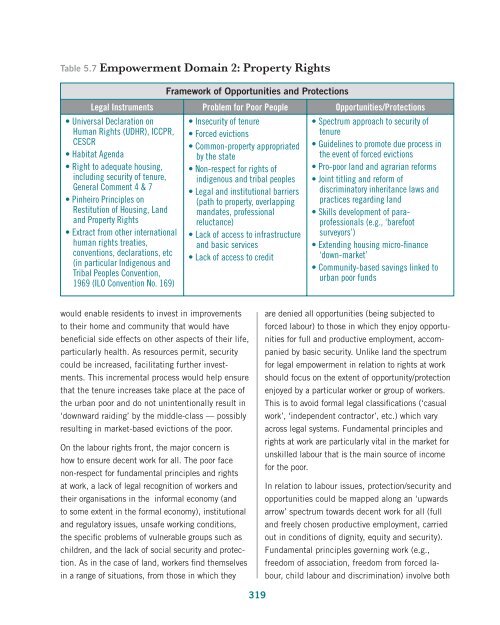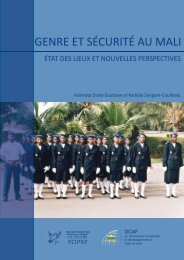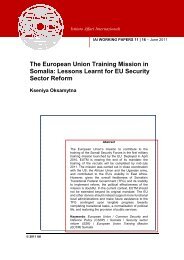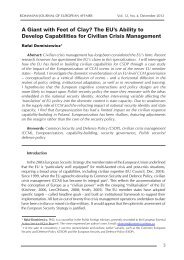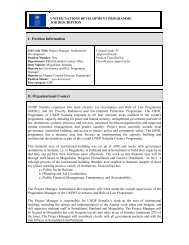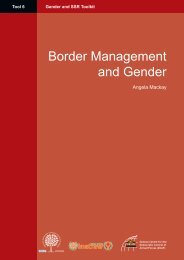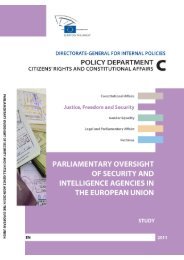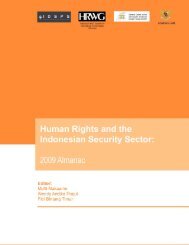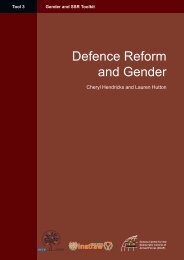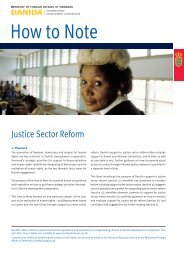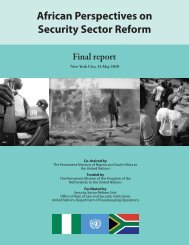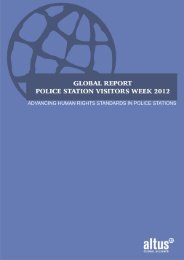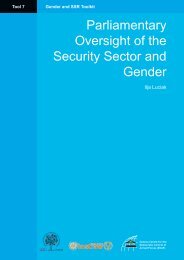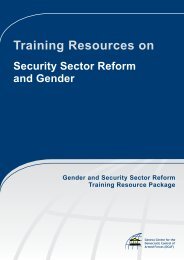Making The Law Work for Everyone Commission on Legal ... - ISSAT
Making The Law Work for Everyone Commission on Legal ... - ISSAT
Making The Law Work for Everyone Commission on Legal ... - ISSAT
Create successful ePaper yourself
Turn your PDF publications into a flip-book with our unique Google optimized e-Paper software.
Table 5.7 Empowerment Domain 2: Property RightsFramework of Opportunities and Protecti<strong>on</strong>s<strong>Legal</strong> Instruments Problem <str<strong>on</strong>g>for</str<strong>on</strong>g> Poor People Opportunities/Protecti<strong>on</strong>s• Universal Declarati<strong>on</strong> <strong>on</strong>Human Rights (UDHR), ICCPR,CESCR• Habitat Agenda• Right to adequate housing,including security of tenure,General Comment 4 & 7• Pinheiro Principles <strong>on</strong>Restituti<strong>on</strong> of Housing, Landand Property Rights• Extract from other internati<strong>on</strong>alhuman rights treaties,c<strong>on</strong>venti<strong>on</strong>s, declarati<strong>on</strong>s, etc(in particular Indigenous andTribal Peoples C<strong>on</strong>venti<strong>on</strong>,1969 (ILO C<strong>on</strong>venti<strong>on</strong> No. 169)• Insecurity of tenure• Forced evicti<strong>on</strong>s• Comm<strong>on</strong>-property appropriatedby the state• N<strong>on</strong>-respect <str<strong>on</strong>g>for</str<strong>on</strong>g> rights ofindigenous and tribal peoples• <strong>Legal</strong> and instituti<strong>on</strong>al barriers(path to property, overlappingmandates, professi<strong>on</strong>alreluctance)• Lack of access to infrastructureand basic services• Lack of access to credit• Spectrum approach to security oftenure• Guidelines to promote due process inthe event of <str<strong>on</strong>g>for</str<strong>on</strong>g>ced evicti<strong>on</strong>s• Pro-poor land and agrarian re<str<strong>on</strong>g>for</str<strong>on</strong>g>ms• Joint titling and re<str<strong>on</strong>g>for</str<strong>on</strong>g>m ofdiscriminatory inheritance laws andpractices regarding land• Skills development of paraprofessi<strong>on</strong>als(e.g., ‘barefootsurveyors’)• Extending housing micro-finance‘down-market’• Community-based savings linked tourban poor fundswould enable residents to invest in improvementsto their home and community that would havebeneficial side effects <strong>on</strong> other aspects of their life,particularly health. As resources permit, securitycould be increased, facilitating further investments.This incremental process would help ensurethat the tenure increases take place at the pace ofthe urban poor and do not unintenti<strong>on</strong>ally result in‘downward raiding’ by the middle-class — possiblyresulting in market-based evicti<strong>on</strong>s of the poor.On the labour rights fr<strong>on</strong>t, the major c<strong>on</strong>cern ishow to ensure decent work <str<strong>on</strong>g>for</str<strong>on</strong>g> all. <str<strong>on</strong>g>The</str<strong>on</strong>g> poor facen<strong>on</strong>-respect <str<strong>on</strong>g>for</str<strong>on</strong>g> fundamental principles and rightsat work, a lack of legal recogniti<strong>on</strong> of workers andtheir organisati<strong>on</strong>s in the in<str<strong>on</strong>g>for</str<strong>on</strong>g>mal ec<strong>on</strong>omy (andto some extent in the <str<strong>on</strong>g>for</str<strong>on</strong>g>mal ec<strong>on</strong>omy), instituti<strong>on</strong>aland regulatory issues, unsafe working c<strong>on</strong>diti<strong>on</strong>s,the specific problems of vulnerable groups such aschildren, and the lack of social security and protecti<strong>on</strong>.As in the case of land, workers find themselvesin a range of situati<strong>on</strong>s, from those in which theyare denied all opportunities (being subjected to<str<strong>on</strong>g>for</str<strong>on</strong>g>ced labour) to those in which they enjoy opportunities<str<strong>on</strong>g>for</str<strong>on</strong>g> full and productive employment, accompaniedby basic security. Unlike land the spectrum<str<strong>on</strong>g>for</str<strong>on</strong>g> legal empowerment in relati<strong>on</strong> to rights at workshould focus <strong>on</strong> the extent of opportunity/protecti<strong>on</strong>enjoyed by a particular worker or group of workers.This is to avoid <str<strong>on</strong>g>for</str<strong>on</strong>g>mal legal classificati<strong>on</strong>s (‘casualwork’, ‘independent c<strong>on</strong>tractor’, etc.) which varyacross legal systems. Fundamental principles andrights at work are particularly vital in the market <str<strong>on</strong>g>for</str<strong>on</strong>g>unskilled labour that is the main source of income<str<strong>on</strong>g>for</str<strong>on</strong>g> the poor.In relati<strong>on</strong> to labour issues, protecti<strong>on</strong>/security andopportunities could be mapped al<strong>on</strong>g an ‘upwardsarrow’ spectrum towards decent work <str<strong>on</strong>g>for</str<strong>on</strong>g> all (fulland freely chosen productive employment, carriedout in c<strong>on</strong>diti<strong>on</strong>s of dignity, equity and security).Fundamental principles governing work (e.g.,freedom of associati<strong>on</strong>, freedom from <str<strong>on</strong>g>for</str<strong>on</strong>g>ced labour,child labour and discriminati<strong>on</strong>) involve both319


